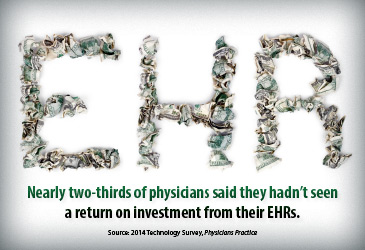 When it comes to issues with health IT, physicians overwhelmingly point to one problem. Here’s what physicians think about electronic health record (EHR) systems.
When it comes to issues with health IT, physicians overwhelmingly point to one problem. Here’s what physicians think about electronic health record (EHR) systems.
A recent survey (login required) by Physicians Practice found that physicians say EHR adoption, implementation and interoperability are their most pressing technology problem.
While about 53 percent of the more than 1,400 physicians who responded to the survey said they did have a fully implemented EHR system in their practices, about 20 percent said they didn’t yet have one. The main reasons for not having an EHR system were related to cost or the lack of products available to meet their needs, according to the survey. Another 17 percent said they used an EHR system selected by their parent hospital or corporation.
Roughly one-third of respondents said their EHR system has made practice work flow less efficient, while nearly one-half said the technology has made it more efficient.
The survey results echo findings from the AMA’s 2013 study, conducted in partnership with the RAND Corporation, which found EHR systems to be a major contributor to physicians’ professional dissatisfaction. The physicians surveyed for the AMA study expressed concern that current technology requires physicians to spend too much time on clerical work, putting up barriers to providing high-quality care.
The AMA study also revealed that EHRs were more costly than anticipated and didn’t provide the technology needed to interact with other systems, causing difficulties in transmitting patient information.
About 16 percent of physicians surveyed by Physicians Practice indicated the lack of EHR interoperability was their most pressing issue, and another 13 percent cited costs to implement the systems as a problem. About one-quarter of physicians that did not have an EHR said they didn’t have the technology because it was too expensive. Nearly two-thirds said they have not seen a return on investment.
According to Physicians Practice, EHR use is seeing a slow but steady trend upward. In 2010, 48 percent of responding practices had implemented an EHR. By 2014, that number climbed to 70 percent.
As part of its Professional Satisfaction and Practice Sustainability initiative, the AMA is developing a set of priorities and recommendations to improve the usability of EHR systems, identifying opportunities to achieve these improvements, and determining a research agenda to advance the evidence base for increasing usability.
The AMA is taking physician issues and recommendations directly to EHR vendors to encourage them to make the necessary changes in their future product designs and is working with the Electronic Health Records Association on these efforts.
Read more about how the AMA is working to make EHR systems less burdensome and more beneficial for physicians and their patients.




